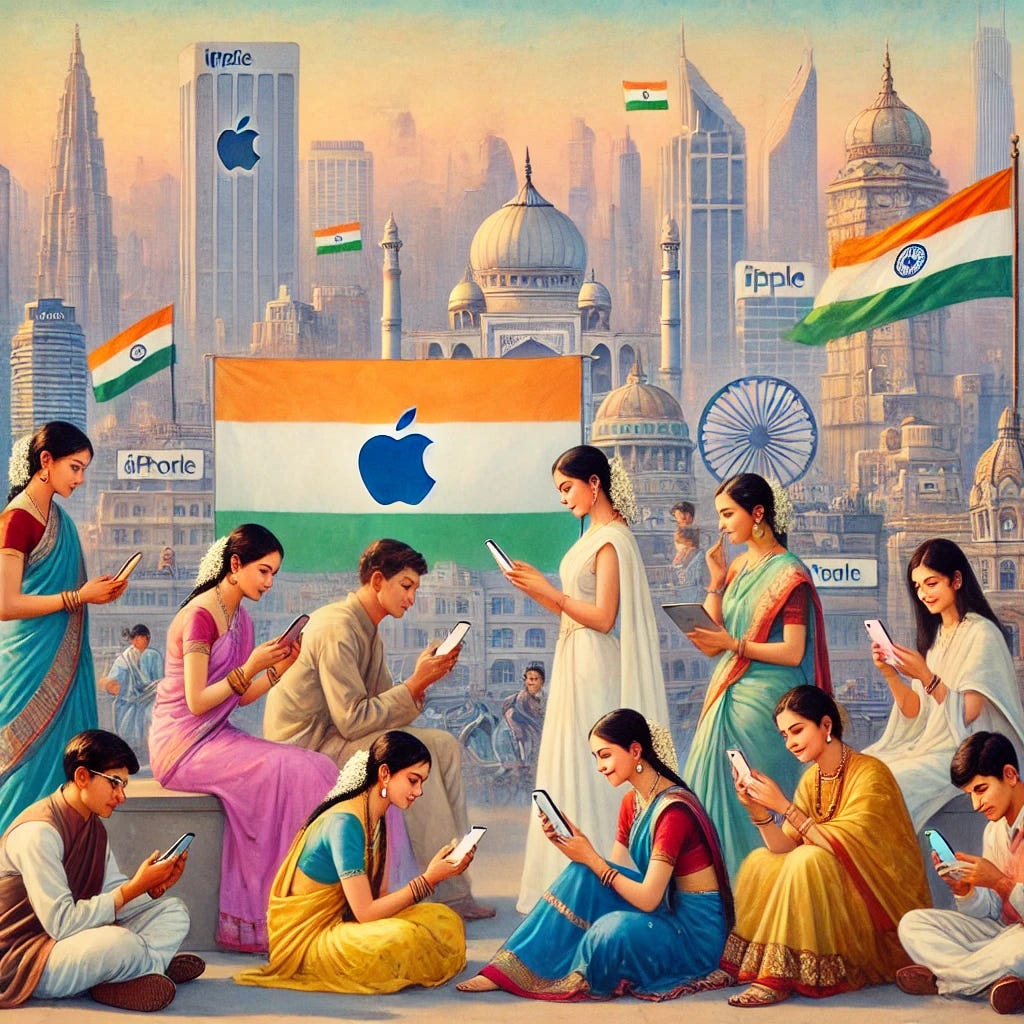Apple's India Sales Climb 33% to New High Amid Shift Away from China
Apple Inc.'s Strategic Expansion and Challenges in India: Balancing Growth, Privacy Concerns, and Anticipation for 'Apple Intelligence
Impressive Sales Milestones
Apple Inc. has witnessed a significant surge in its annual sales in India, reaching a new high of nearly $8 billion in the 12 months ending March 2024. This represents a robust 33% increase from the previous year's sales of $6 billion. The popularity of Apple's iPhones, which constituted more than half of the total sales, was a major driver of this growth. This surge in revenue is indicative of Apple's strategic efforts to penetrate the Indian market, which is characterized by rising consumer purchasing power and a burgeoning middle class.
Market Position and Expansion Efforts
Despite these record sales, Apple's market share in the Indian smartphone sector remains modest. iPhones account for only about 3.5% of the nearly 690 million smartphones in use across the nation. This is in stark contrast to the dominance of more affordable Android devices from Chinese manufacturers. However, India is still one of Apple's fastest-growing markets, contributing 2% to its global sales of $383 billion in the latest fiscal year.
In a move to deepen its market penetration, Apple CEO Tim Cook inaugurated the first two Apple Stores in India last year. These stores not only serve as retail hubs but also as symbols of Apple's commitment to the Indian market. The company perceives India's growing middle class as pivotal in diversifying its market base beyond China, especially given the ongoing US-China trade tensions.
Boosting Local Manufacturing
To further solidify its foothold, Apple is ramping up its manufacturing capabilities within India. The company now assembles several iPhone models domestically, including the latest iPhone 15. Notably, most of these locally assembled devices are exported. Apple's assembly partners in India have doubled their production to $14 billion worth of iPhones last fiscal year, making up about 14% of Apple's global iPhone production. This move not only helps in reducing logistical costs but also aligns with the Indian government's push for increased local manufacturing under its "Make in India" initiative.
India Awaits "Apple Intelligence" to Enhance iOS Device Capabilities
At an event on June 10 at Apple's headquarters in Cupertino, California, the company unveiled "Apple Intelligence," a groundbreaking feature aimed at boosting iOS device sales in India, including the latest iPhone models. Scheduled for release in the USA in the second half of this year and in India by late 2025, "Apple Intelligence" introduces a sophisticated three-tiered processing system for user queries. The first tier leverages powerful on-device proprietary microchips to swiftly handle routine queries without compromising private data. More complex requests are processed at Apple's own data centers. The highest tier of processing, involving anonymized data, is managed by OpenAI's servers, under a newly formed partnership, with explicit user consent. This innovative approach, prioritizing user privacy and data handling efficiency, positions Apple's iOS devices as highly competitive, particularly with its postponed rollout in Europe due to regulatory challenges.
Impact of Pegasus Spyware on iPhone Security in India
In 2021, revelations by the "Pegasus Project" international media consortium shed light on the potential use of Pegasus spyware, developed by the Israeli NSO Group, to target over 300 Indian mobile phones. This list included journalists, activists, opposition politicians, and even government ministers. Pegasus is engineered to infiltrate mobile devices to extract data and covertly activate cameras and microphones. The exposure of such a sophisticated spyware operating on Apple iPhones, traditionally lauded for their stringent security measures, has raised profound security concerns. Apple's response involved notifying affected users in India, among other countries, about potential compromises by "mercenary spyware." However, Apple shifted its language from "state-sponsored attacks" to "mercenary spyware" following pushback from the Indian government, which also questioned the implications of such warnings for national security and initiated an inquiry into iPhone's security vulnerabilities. These developments underscore the delicate balance between national security and individual privacy rights, highlighting the challenges tech companies face in their operations within different governmental frameworks.
Legal and Privacy Implications in the Wake of Pegasus
The response to the spyware's detection has been marked by significant legal and social ramifications. Several petitions led to the Supreme Court of India forming a technical committee to investigate the government's alleged use of spyware for surveillance purposes. However, the lack of perceived cooperation from the government and the non-disclosure of the committee's findings have only added layers of opacity, fueling concerns about surveillance overreach and the protection of civic freedoms. In late 2023, forensic analyses by Amnesty International confirmed Pegasus infections on the devices of prominent Indian journalists, evidencing a sophisticated "zero-click" exploit that bypasses user interaction entirely. These incidents not only question the security of Apple's ecosystem but also reflect broader issues regarding the potential misuse of spy technology by state and non-state actors. The situation calls for a transparent, independent investigation into the alleged uses of Pegasus, aiming to establish clearer accountability and strengthen privacy norms to safeguard Indian citizens against unauthorized surveillance and data breaches in an increasingly digital society, especially in the context of similar cautionary messages from Apple to its users, mainly journalists and social-media activists.
Regulatory Challenges and Consumer Protection
While Apple continues to expand its presence in India, it faces potential regulatory challenges similar to those encountered in Europe. The Competition Commission of India (CCI), India's monopoly regulator, may take cues from its European counterparts to ensure that consumers are protected not only in terms of privacy but also against unfair pricing practices. The focus may extend to Apple's control over access to third-party apps and payment mechanisms outside of the Apple Inc. ecosystem.
Apple’s Strategic Optimism in India Amidst Global Challenges
Despite facing numerous challenges, Apple remains enthusiastically optimistic about its prospects in India, particularly with the introduction of "Apple Intelligence." This groundbreaking feature is set to redefine user engagement through enhanced processing capabilities, emphasizing privacy with sophisticated on-device data management. Apple's comprehensive commitment to enhancing its entire ecosystem—from development and marketing to operations—reflects a strategic long-term vision aimed at harnessing India’s significant market potential. Yet, the excitement is tempered by valid concerns over privacy breaches and the threats posed by sophisticated hacking incidents, like those unveiled by the Pegasus spyware exposure. These issues highlight critical vulnerabilities that necessitate stringent security measures to protect user data against unauthorized breaches.
As Apple manages shifting trade dynamics with China, where it generated $72.6 billion in sales, India presents a viable diversification opportunity with its own $8 billion in sales. This strategic pivot is crucial as Apple seeks to not just preserve but also expand its market share in India. With continued investments in local capabilities and careful navigation through regulatory frameworks, Apple is addressing these security concerns proactively, ensuring that robust privacy protections are in place. By balancing technological innovation with strong security protocols, Apple aims to secure its role as a key player in one of the world's most dynamic markets, leveraging both the excitement for new technologies and the critical need for privacy and security.






